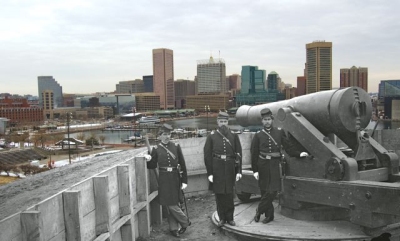
Three Union soldiers are stationed on Federal Hill overlooking what is now the Inner Harbor of Baltimore (1862 photo). Their cannon is trained on the city as Baltimore was under martial law throughout the Civil War. Lincoln was afraid that Maryland would secede from the Union cutting Washington D.C. off from the North. The background is a contemporary photo of Baltimore from the same angle. The historic photo is part of the Maryland Historical Society's Civil War exhibit, Divided Voices: Maryland in the Civil War, the largest and most comprehensive display on the subject in the state.
BALTIMORE (April 3, 2011) — The Maryland Historical Society’s (MdHS) Museum will open Maryland’s largest and most comprehensive Civil War exhibit on April 16. The impact of the war on the people of Maryland will be told in personal terms in “Divided Voices: Maryland in the Civil War.” The largest Civil War exhibit in the museum’s 167-year history will occupy over 5,000 square feet and tell the story of a tragedy in three acts: the romantic war, the real war and the long reunion.
The exhibit will take visitors back in time with 3-D videos that will lead them back to 1861. There will also be interactive exhibits designed for children and adults as well as storyteller guides in period costumes. On Saturdays and Sundays the Maryland Historical Society Players will perform short vignettes of major events that took place in Maryland. Admission - $6 adults, $5 seniors, 3-18 $4, under 3 free. Museum is free on first Thursday of each month.
The romantic war was the first year or so of the conflict, when both sides saw the war as an adventure and patriotic duty. The real war over the next three years of bloodshed left hundreds of thousands of young men dead. The long reunion focuses on the reuniting of the country, which some say is not complete to this day.
Maryland sent 60,000 men to serve in the Union Army. Over 20,000 more served in the Confederacy. The first bloodshed of the war took place in Baltimore. The human stories of these men and women are told by bringing letters to life with today’s technology, as well as the display of hundreds of rare objects, many of which have not been shown publicly since the 19th century. Museum visitors will see Robert E. Lee’s camp chair, John Brown’s carbine, Abraham Lincoln memorabilia from the Civil War era as well as compelling and heartbreaking photographs of the period.
Visitors will learn of Maryland’s major battles like Antietam and of lesser-known battles like the Battles of Monocacy and Silver Spring. They will come to understand how the soldiers suffered. More than 600,000 servicemen died in the Civil War, compared to 400,000 American deaths in World War II. It was the deadliest war in American history.
Museum goers will discover why the first widely-used bullet made this one of history’s bloodiest wars and how this spurred advances in medical care. Triage, the ambulance corps, field hospitals and many significant surgical advances all began during the Civil War.
The war’s impact on Maryland’s citizens will be revealed. Baltimore, for example, was under martial law and occupied by Union troops for the entire war. Lincoln’s suspension of the writ of habeas corpus ( people can’t be jailed without trial or a hearing) was famously used against John Merryman of Cockeysville, Maryland. Lincoln was willing to break the law to keep Maryland from joining the Confederacy and cutting the capital off from the North. The State legislature moved from Annapolis to Frederick to keep Maryland from joining the Confederacy.
Visitors also will learn the important role that African Americans played in the war. Over 10,000 African Americans served in the Union Army. Harriet Tubman served as a spy for the Union Army during the war. Black soldiers such as Christian Fleetwood of Baltimore led African American troops into battle and earned America’s highest military honor.
Women’s growing role in society during those years will be revealed. They began serving as nurses for the first time. Women on the home front mourned their dead, creating the “Empty Chair” tradition at dinner tables in Maryland and elsewhere.
The Civil War exhibit will run for the next four years with annual updates. Visitors to the museum will also find major exhibits of famous Maryland paintings, silver, furniture, maritime history and children’s toys from the last 300 years.
For more information on this 150th anniversary of the war exhibit, go to www.mdhs.org or call 410-685-3750.
The Maryland Historical Society was founded in 1844 and is the world’s largest museum and library dedicated to the history of Maryland. Occupying an entire city block in the Mount Vernon district of Baltimore, the society’s mission is to “collect, preserve, and interpret the objects and materials that reflect Maryland’s diverse cultural heritage.” The Society is home to the original manuscript of the Star Spangled Banner and publishes a quarterly titled “Maryland Historical Magazine.”


